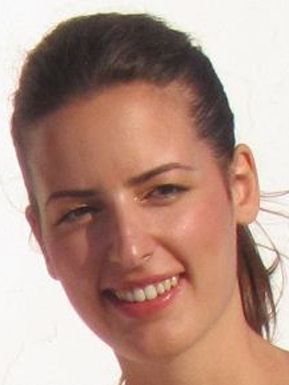Three CFA Grads Win $10K
Kahn Awards go to opera singer, actor, and sculptor

John Irvin was in the middle of moving to Chicago when he learned that he had been awarded an Esther B. and Albert S. Kahn Career Entry Award—an honor that could help launch his career as an opera singer. “I had to maintain composure to stay on the road,” says Irvin.
Originally trained as a pianist, Irvin (CFA’12) discovered opera as an undergraduate at Georgia State University, when he was cast as the Governor in Leonard Bernstein’s Candide. “It was during the first rehearsals that I realized that I had something special to offer the world through my voice,” recalls Irvin, who is about to graduate from the BU Opera Institute.
Irvin is joining Chicago’s Lyric Opera Company as a Ryan Opera Center Artist. He says that the $10,000 prize will help pay for “coaching and lessons with some of the most sought-after professionals the opera world has to offer.”
“Too often,” he says, “artists fail at what they do, not because of a lack of talent or hard work, but because of a lack of resources. Career grants and prize awards are crucial in helping artists to stay afloat while they begin establishing careers.” He also plans to use some of the proceeds to build his website.
Created in 1985, the Kahn Awards are funded by a $1 million endowment from the late Esther Kahn (SED’55, Hon.’86). They are presented annually to three CFA students who are in the final semester of their undergraduate or graduate studies. This year’s other recipients are Cloteal Horne (CFA’12), a graduating School of Theatre student, and Natalia Afentoulidou (CFA’12), who is completing a master’s degree at the School of Visual Arts.
“Our mother wanted to create a gift for Boston University, where every member of our family at some time in their lives received an education,” says Linda Green (SED’63), one of the Kahns’ daughters. “The idea of having a foundation in perpetuity came from talks our mother had with Phyllis Curtin, who was then dean of the School for the Arts.”
The director of each of CFA’s schools, Music, Visual Arts, and Theatre, chooses up to eight candidates for consideration, and semifinalists are then reviewed by a committee made up of CFA’s dean and the schools’ directors. This year there were nine finalists—three from each school. Winners were chosen by a final selection committee, which this year included Green, her sister, Deborah Kahn (SED’67), Lisa Tung, Massachusetts College of Art and Design director of curatorial programs and professional galleries, Anthony Fogg, Boston Symphony Orchestra artistic administrator, Steven Maler, Commonwealth Shakespeare Company founding artistic director, and CFA Dean Benjamin Juarez.

Horne says she was a giddy seventh grader when she saw a one-woman show called Peter and Wendy at San Diego’s La Jolla Playhouse that would change her life. “For two hours, I watched this beautiful African American actress transform before my eyes,” recalls Horne. “It was in that moment I realized that little girls that looked like me did belong on stage and that I too could command a stage.”
She enrolled in the Lilac Theatre, a budding after-school program at Bell Junior High School in San Diego, where she performed in productions of Dickens’ A Christmas Carol and Shakespeare’s Much Ado About Nothing. “Being exposed to theater as a child changed the entire trajectory of my life,” she says. “Since igniting that flame, I have been following my bliss, training rigorously as an actress so that one day some little girl who looks like me will know that she can do it too.”
As a School of Theatre student, Horne has appeared in The Miller Project, The Underpants, Time Remembered, Marisol, Lynn Nottage’s Intimate Apparel, and Sartre’s No Exit.
“Cloteal has been an extraordinary student from the beginning of her time with us,” says Jim Petosa, a CFA professor and School of Theatre director. “She has embraced every role she has been given with energy, curiosity, and drive.”
Horne, who had to create a 10-minute presentation as a Kahn Award finalist, was preparing for her senior thesis when she learned that she’d won. She says the money will fund a production of Nilaja Sun’s solo play No Child, in which she’ll play 16 different characters. The drama, which had an acclaimed off Broadway run several years ago, depicts students, teachers, and families grappling with an education system that threatens to fail them. Horne hopes to bring the show to theater festivals and schools across the country. “I believe that if schools cannot afford theater education,” she says, “then art should be brought to them.”

Natalia Afentoulidou earned a BFA from the Athens School of Fine Arts in her native Greece before coming to BU. She says her BU experience changed her work completely. “I found the most inspiring professors and the most wonderful studio here,” says Afentoulidou, who builds structures from discarded materials to illustrate “how much we take for granted, how much we ignore, and how much we can become aware of if we take the time to focus on the simple and true values of life.”
Afentoulidou will use the prize money to rent a studio. “First, and most importantly, the prize is a tremendous motivation,” she says. “It enables me to dream further and start strong.”
Lynne Allen, a CFA professor and School of Visual Arts director, says Afentoulidou willingly tackles “the tough questions of her native Greece’s economic decline,” contrasted “with the opulence and excessiveness of the United States.”
“Cloteal, Natalia, and John are exemplary 21st-century artists: showcasing their highest artistic caliber while also serving as committed citizens,” says Juarez. “They are each aware of the role of the artist as educator in the drive for social change—Natalia speaks about consumerism, Cloteal about inclusion and diversity, and John about building new audiences for the arts.”
Comments & Discussion
Boston University moderates comments to facilitate an informed, substantive, civil conversation. Abusive, profane, self-promotional, misleading, incoherent or off-topic comments will be rejected. Moderators are staffed during regular business hours (EST) and can only accept comments written in English. Statistics or facts must include a citation or a link to the citation.